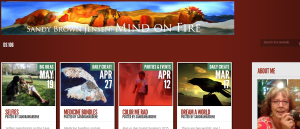An Institute for Community College Digital Humanists: Beyond Pockets of Innovation, Toward a Community of Practice
MONDAY
Jesse Stommel, “Making and Breaking in the Digital Humanities: Non-traditional Pedagogies for Community College Students”
Readings:
Introduction and Part I, Debates in the Digital Humanities. Matthew K. Gold, editor.
Stephen Ramsay, “The Hermeneutics of Screwing Around; or What You Do with a Million Books”
Jesse Stommel, “The Digital Humanities is About Breaking Stuff” and “Critical Digital Pedagogy: a Definition”
Sean Michael Morris, “What is Digital Pedagogy?”
Jesse Stommel and Sean Michael Morris, “Ten Things the Best Digital Teachers Do”
Mark Sample, “Building and Sharing (When You’re Supposed to Be Teaching)”
Mark Sample, “Notes towards a Deformed Humanities.”
Adeline Koh, “Introducing Digital Humanities Work to Undergraduates: An Overview”
Instructions/Preparations from Sandy Brown Jensen,
Master Digital Storyteller
Notes about What to Bring
Welcome to the “Thinking About the Digital Part of the Digital Humanities Institute!”
- We will be doing a variety of quick digital story projects throughout the week.
- You will find it handy to have with you a cell phone, camera, or tablet that takes both stills and video.
- Please have a video editing app faced on your Device of Choice. For example, iMovie on an i-Device.
- Please have created a free YouTube or Vimeo account and have it faced to the same device that has your photo editing app.
- Make sure you have an e-mail program installed and functional on that same device.
- Think ahead to bringing the device(s) you are most comfortable working on.
- Dealing with tech delays is never fun, so if everyone shows up with their devices and their own chargers, with plenty of free memory, that would be some kind of Dream Come True.
- Please make sure devices are charged before sessions every day during the Institute.
______________________________________________________________________________
TUESDAY
Matthew K. Gold, “Communities and Classrooms as Living Laboratories for Digital Humanities Work”
Readings AND Links
Introductions
Lisa Spiro, “Getting Started in the Digital Humanities.” (with special attention to browsing resource links).
Anne Burdick et al., “The Project as Basic Unit” and “Learning Outcomes for the Digital Humanities” in Burdick et al., Digital_Humanities.
(Recommended, Not Required) John Unsworth, “Documenting the Reinvention of Text: The Importance of Failure.” Lessons Learned in Electronic Publishing Volume 3, Issue 2 (December, 1997). http://quod.lib.umich.edu/cgi/t/text/text-idx?c=jep;view=text;rgn=main;idno=3336451.0003.201
Theories
Johanna Drucker, “Humanities Approaches to Graphical Display.” Digital Humanities Quarterly. Volume 5 Number 1 (2011). http://www.digitalhumanities.org/dhq/vol/5/1/000091/000091.html
Matthew G. Kirschenbaum, “What Is an @uthor?” Los Angeles Review of Books. 6 February 2015. http://lareviewofbooks.org/essay/uthor
Franco Moretti – Slaughterhouse of Literature, MLQ: Modern Language Quarterly, Volume 61, Number 1 (March 2000): 207-227.
Michael Witmore, “Text: A Massively Addressable Object.” Debates in the Digital Humanities, ed. Matthew K. Gold. Minneapolis: University of Minnesota Press, 2012. http://dhdebates.gc.cuny.edu/debates/text/28
Practices and Projects
Matthew K. Gold, “Looking for Whitman: a Multicampus Experiment in Digital Pedagogy.” In Brett D. Hirsch, ed. Digital Humanities Pedagogy: Practices, Principles and Politics. Cambridge, UK: Open Book Publishers, 2012.
Jeffrey McClucken, “Teaching and Learning with Omeka: Discomfort, Play and Creating Public, Online Digital Collections.” In Learning Through Digital Media. Trebor Sholz, ed.
On Building Things: Student-Designed Print and Digital Exhibits in a Book History Class In Transformations: the Journal of Inclusive Scholarship and Pedagogy. XXII, 1, Summer 2011.
Select 2-3 keywords that interest you. Please note that this is all draft work that has not yet been peer reviewed. from Digital Pedagogy in the Humanities, Ed. Rebecca Frost Davis, Matthew K. Gold, Katherine D. Harris, and Jentery Sayers. Modern Language Association (Forthcoming) – Draft keywords: https://github.com/curateteaching/digitalpedagogy/tree/master/keywords
_____________________________________________________________________________
WEDNESDAY:
Marta Effinger-Crichlow: “Mapping Black New York: An Interdisciplinary Search for Home”
Readings:
Anita Hill, “Gender and Race at Home in America. In Anita HIll, Reimagining Equality: Stories of Gender, Race and Finding Home.” Boston: Beacon 2011.
Chris Johanson et al, “Teaching Digital Humanities Through Digital Cultural Mapping.” In Digital Humanities Pedagogy: Practices, Principles and Politics. Ed. Brett D. Hirsch.
Virginia Kuhn and Vicki Callahan, “Nomadic Archives: Remix and the Drift to Praxis.” In Digital Humanities Pedagogy: Practices, Principles and Politics. Ed. Brett D. Hirsch.
Moya Bailey, “All the Digital Humanists are White, All the Nerds are Men, But Some of Us Are Brave.” Journal of Digital Humanities. 1. 1. 2011.
Tara McPherson, “Why are the Digital Humanities So White? Or Thinking the Histories of Race and Computation.” In Debates in the Digital Humanities.
_________________________________________________________________________
THURSDAY
Roopika Risam, “Decolonizing Digital Humanities and Rewriting Wikipedia”
Readings:
“The Rewriting Wikipedia Project: Why Rewrite Wikipedia” by Adeline Koh and Roopika Risam. Postcolonial Digital Humanities. Blog. 21 March 2013
Jakob Nielsen, “Participation Inequality: Encouraging More Users to Contribute.” Neilsen Norman Group. Blog. October 9, 2006.
Lisa Nakamura and Peter A. Chow-White. “Race and Digital Technology Code, the Color Line, and the Information Society.” In Race After the Internet. New York: Routledge 2012.
Melanie Kill. “Teaching Digital Rhetoric: Wikipedia, Collaboration and the Politics of Free Knowledge.” Digital Humanities Pedagogy: Practices, Principles and Pedagogy. Ed. Brett D. Hirsch
Amy E. Earhart. “Can Information Be Unfettered? Race and the New Digital Humanities Canon.” In Debates in the Digital Humanities.
Lisa Nakamura. “The Racio-Visual Logic of the Internet” (Epilogue). In Nakamura, Digitizing Race: Visual Cultures of the Internet. University of Minnesota Press, 2008.
FRIDAY
Resources for Further Reading. Not required for Friday’s work.
READINGS:
Olin Bjork, “Digital Humanities and the First Year Writing Course.” In Digital Humanities Pedagogy: Practices, Principles and Politics
Various Authors. “Humanities 2.0 Series.” November 2010-July 2011. The New York Times.
Kristin L. Arola, Jennifer Sheppard and Cheryl E. Ball. “Ch. 5: Assembling Your Technologies and Your Team.” In Writer/Designer: A Guide to Making Multimodal Projects. Boston: Bedford, 2014.
Jentery Sayers, “Putting Makerspaces into Spreadsheets.” Maker Lab in the Humanities, University of Victoria. May 23, 2015. Web. May 26, 2015.
Jim Ridolfo and Danielle Nicole, “Composing for Recomposition: Rhetorical Velocity and Delivery.” Kairos: a Journal of Rhetoric, Technology and Pedagogy. January 15, 2009. 13.2.



Pingback: Digital Humanities | Pearltrees
Pingback: This Week in Digital Humanities and Pedagogy